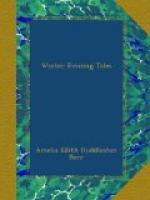He was so admirable that he ceased to interest people, and every time he visited Glasgow fewer and fewer of his old acquaintances came to see him. A little more than ten years after his admission to the firm of Gordon & Co. he came home at the new year, and presented his father with the title-deeds of Ellenmount and Netherby. The next day old Andrew was welcomed on the City Exchange as “Lockerby of Ellenmount, gentleman.” “I hae lived lang enough to hae seen this day,” he said, with happy tears; and David felt a joy in his father’s joy that he did not know again for many years. For while a man works for another there is an ennobling element in his labor, but when he works simply for himself he has become the greatest of all slaves. This slavery David now willingly assumed; the accumulation of money became his business, his pleasure, the sum of his daily life.
Ten years later both his uncle and father were dead, and both had left David every shilling they possessed. Then he went on working more eagerly than ever, turning his tens of thousands into hundreds of thousands and adding acre to acre, and farm to farm, until Lockerby was the richest estate in Annandale. When he was forty-five years of age fortune seemed to have given him every good gift except wife and children, and his mother, who had nothing else to fret about, worried Janet continually on this subject.
“Wife an’ bairns, indeed!” said Janet; “vera uncertain comforts, ma’am, an’ vera certain cares. Our Master Davie likes aye to be sure o’ his bargains.”
“Weel, Janet, it’s a great cross to me—an’ him sae honored, an’ guid an’ rich, wi’ no a shilling ill-saved to shame him.”
“Tut, tut, ma’am! The river doesna’ swell wi’ clean water. Naebody’s charged him wi’ wrangdoing—that’s enough. There’s nae need to set him up for a saint.”
“An’ you wanted him to be a minister, Janet.”
“I was that blind—ance.”
“We are blind creatures, Janet.”
“Wi’ excepts, ma’am; but they’ll ne’er be found amang mithers.”
This conversation took place one lovely Sabbath evening, and just at the same time David was standing thoughtfully on Princes street, Edinburgh, wondering to which church he had better turn his steps. For a sudden crisis in the affairs of a bank in that city had brought him hurriedly to Scotland, and he was not only a prudent man who considered public opinion, but was also in a mood to conciliate that opinion so long as the outward conditions were favorable. Whatever he might do in London, in Scotland he always went to morning and evening service.
He was also one of those self-dependent men who dislike to ask questions or advice from anyone. Though a comparative stranger he would not have allowed himself to think that anyone could direct him better than he could choose for himself. He looked up and down the street, and finally followed a company which increased continually until they entered an old church in the Canongate.




